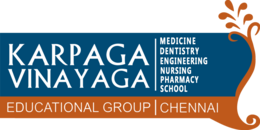- <
- About Us
- Academic
- Committees
- Accreditation
- Student support
- Research
- Group of Institutions
- Contact Us
- .
Location:
KIMS is situated in wide spread area of 30.76 acres of Land with more than 250 villages surrounding it. It is easily accessible to nearby villages as many numbers of public transport is available from and to our Campus.
Enquiry/ reception:
This service is available for 24 hours.
After entering in to the campus, roadmaps/signboards will help the guest to reach at reception or registration counter.
Inquiry through phone: 044-27565195,27566050
Inquiry through mail: kims.medical@yahoo.com
Vision:
To grow as an internationally recognized institute, attaining excellence in the expertise of patient care, medical education and research and development to serve humanity
Mission:
Develop medical education and collaborative initiatives to achieve excellence in medical care, supported by a rigorous academic and research environment. We should be able to attract the best minds in a rewarding and inspiring environment by fostering creativity, innovation and adopting the recent advances in medical technologies. The highest standard of the patient should be aimed to serve the sick and the suffering, irrespective of their economic, social or religious status.
Our Philosophy : To care with compassion and cure with competence.
Objective:
The main objective of citizen charter is to provide quality public service to the citizen by maintaining transparency in administration.
Campus excellence:
The 30.76-acre campus accommodates a 550 bedded hospital block, 5 storeyed College blocks. The campus is equipped with
Academic excellence:
It has three blocks of teaching medicine with pre-clinical, para-clinical and clinical subjects. Students are given excellent training in academics and also encourage in extra-curricular and sports activities too.
Programmes offered:
Undergraduate:
Sl No. | Name of the Program | Annual Intake capacity (Seats per year) |
1. | MBBS | 100 |
2. | Allied Health Sciences: B.Sc -Operation Theatre& Anaesthesia Technology | 20 |
3. | Allied Health Sciences: B. Sc- Radiography & Imaging technology | 20 |
4. | Allied Health Sciences: B. Sc-Medical Lab. Technology (MLT) | 20 |
5. | Allied Health Sciences: B. Sc-Medical Record Science | 20 |
Postgraduate: MD/MS (total 38 seats)
Sl No. | Name of the Program with subject | Annual Intake capacity (Seats per year) |
1. | MD: General Medicine | 4 |
2. | MS: General Surgery | 4 |
3. | MD: Radiodiagnosis | 3 |
4. | MD: Anaesthesia | 3 |
5. | MS: Orthopaedics | 2 |
6. | MS: Obstetrics & Gynaecology | 2 |
7. | MD: Psychiatry | 2 |
8. | MS: Ophthalmology | 2 |
9. | MS: ENT | 1 |
10. | MD: Dermatology, Venerology & Leprosy (DVL) | 1 |
11. | MD: Anatomy | 2 |
12. | MD: Physiology | 2 |
13. | MD: Biochemistry | 2 |
14. | MD: Pathology | 2 |
15. | MD: Pharmacology | 2 |
16. | MD: Microbiology | 2 |
17. | MD: Community Medicine | 2 |
Affiliations & accreditations:
College is approved by Medical Council of India (MCI) and Affiliated to The Tamil Nadu Dr. MGR Medical University. Approved by Government of Tamilnadu.
Hospital is accredited for NABH (Pre-Entry Level) in January 2019 and NABL (Cycle 1) November 2019 and Animal House approved by CPCSEA. Animal House approved by CPCSEA.
Faculty strength:
The institution has 191 teaching staff including all Departments of pre, para & clinical and has about 400-420 non-teaching & technical staff.
Organization Chart: (College side)
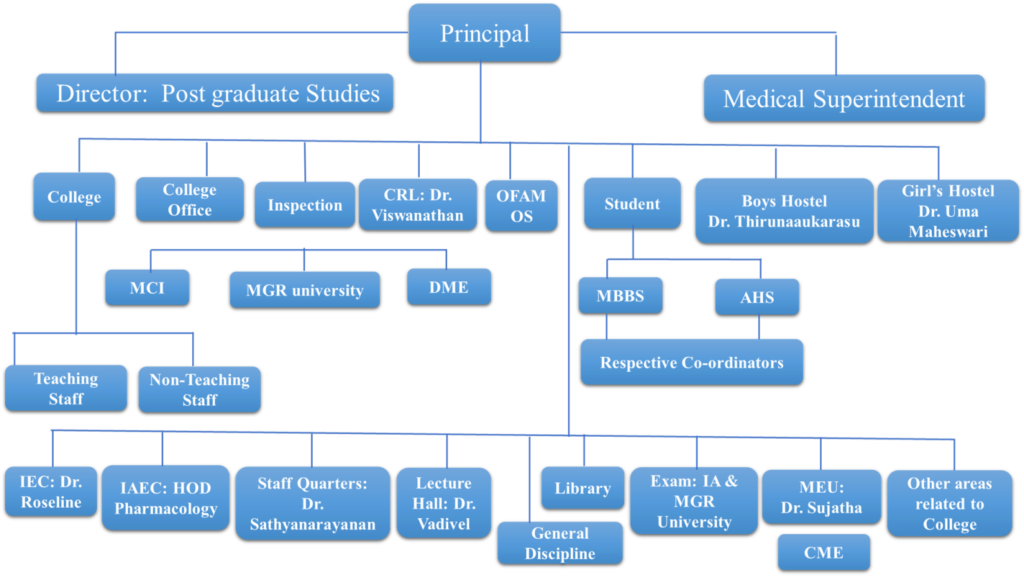
Organization Chart: (hospital side)
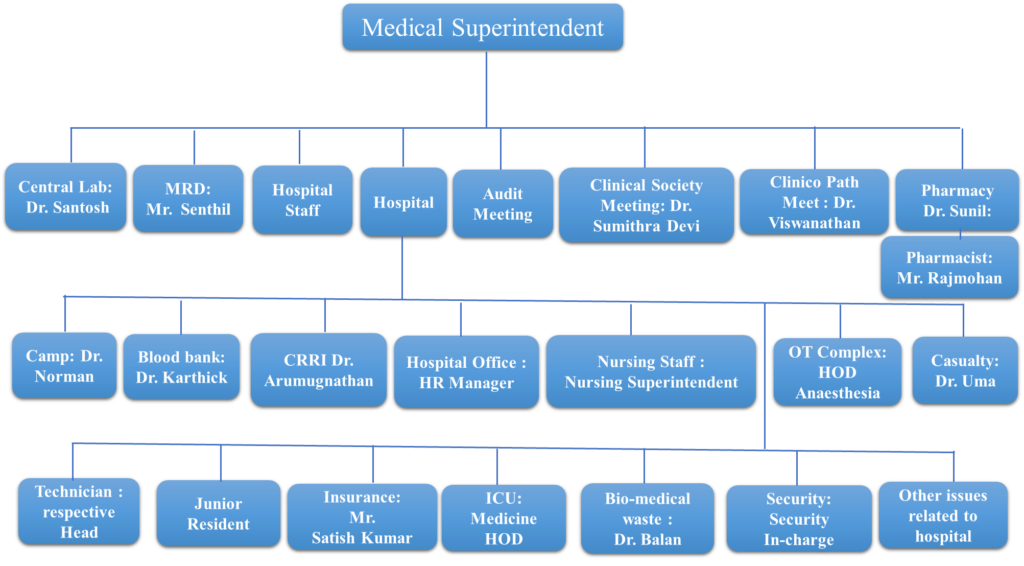
KIMS &RC is committed to the continuous evaluation and improvement of all processes related to delivering comprehensive medical treatment and superior patient care…
Scope of services:

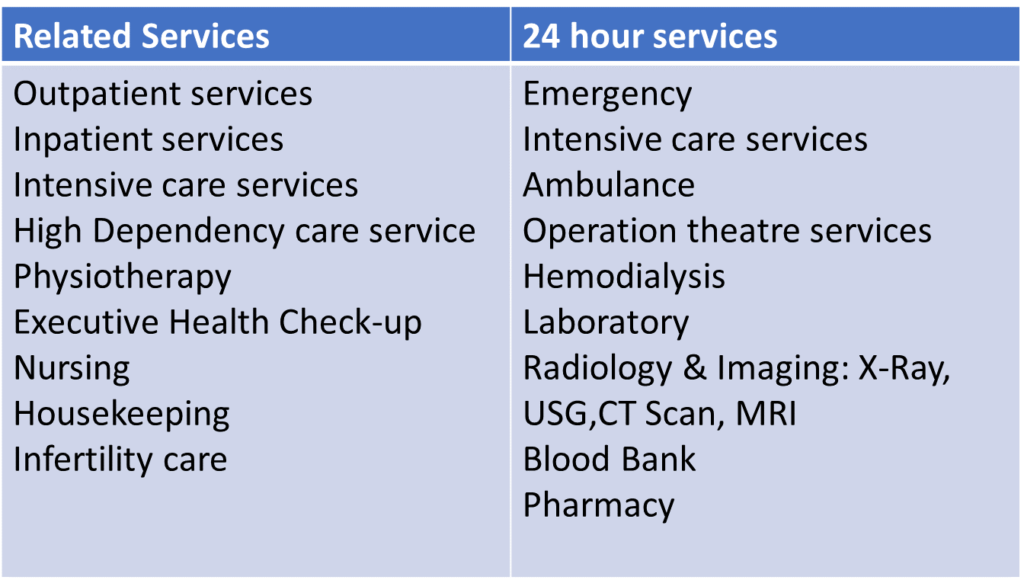
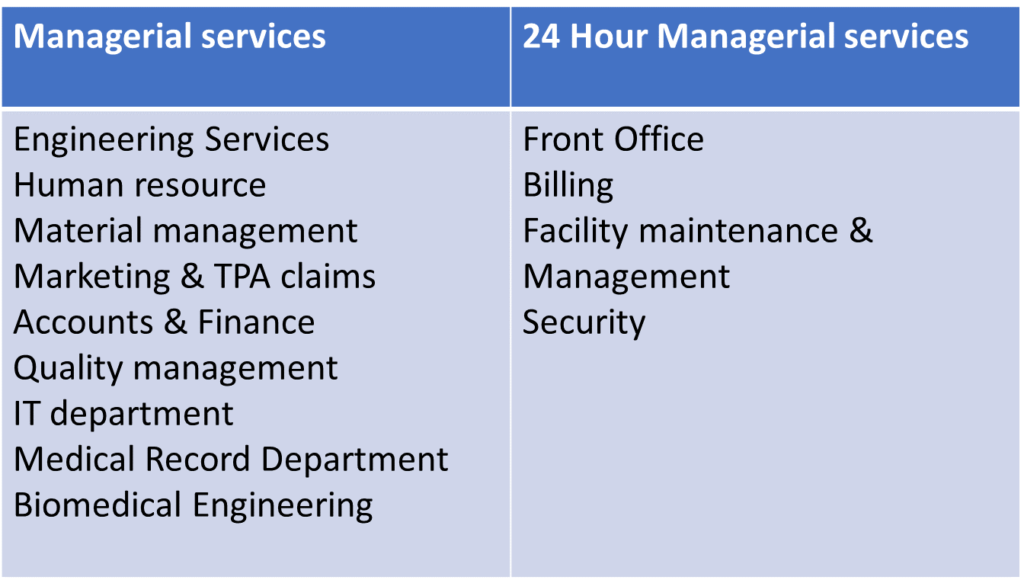
Rights of the patient:
Responsibilities of patient:
Code of Conduct: for students
In our institution at the time of admission each student is giving an Undertaking to abide by the following codes:
Student Support:
Apart from quality education, KIMS & RC provides following services to the students
Code of conduct for support staff:
Duties of the faculty:
As aim of the teaching profession is to educate and kindle the thirst for knowledge the faculties should be concerned and dedicated towards achieving the same
Responsibilities of Principal:
The multiple roles of the Principal such as Administrator, overall supervisor and guide for various academic activities. The codes applicable in the conduct of the Principal are the following:
1.Academic and administrative appraisal
2.Self-appraisal
3.Students’ evaluation
Disciplinary committee:
Sl No. | Name | Designation | Contact Number |
1 | Dr SufalaVishwasrao | Principal | 9551403203 |
2 | Dr M Kannaki | Medical Superintendent | 9444071050 |
3 | Dr S Sathyanarayanan | Medical Director | 9600304013 |
4 | Mr S P K Chidambaram | Chief administrative officer | 7299209000 |
Anti-ragging committee
Sl No. | Designation | Name | Contact Number |
1 | Head of the Institute | Dr. Sufala Vishwasrao | 9551403203 |
2 | Representative of legal authorities | Mr S Durai Ananthan | 9884046432 |
3 | Representative of Police | Inspector Police-Padalam | 9498146797 |
4 | Representative of local media | Mr. E Zafar (Kalaingar TV Kanchipuram) | 9443237786 |
5 | NGO involved in youth activities | Dr N Manoharan BVSc. | 9443090423 |
6 | Representative of member | Dr. D Thirunaaukarasu | 9751590211 |
7 | Representative of parent | Dr P Veeranan Yadav | 9941337771 |
8 | Representative of students belonging to fresher category
Representative of students belonging to Senior category | A A Megha Krishnan
Harini K (Reg. No. 521620526) | 9444856473
9940618293 |
9 | Representative of non-teaching staff | Mrs T Lakshmi | 7904284148 |
Grievance redressal committee:
Sl No. | Name | Designation& Dept. | Position in cell |
1 | Dr. SufalaVishwasrao | Principal | Convener |
2 | Dr. S. Sathyanarayanan | Medical Director | Member |
3 | Dr. Girija Sivkumar | Professor, Anatomy | Member |
4 | Dr. D Thirunaaukarasu | Professor, Community Medicine | Member |
5 | Dr. B Prathap | Associate Professor, Pharmacology | Member |
